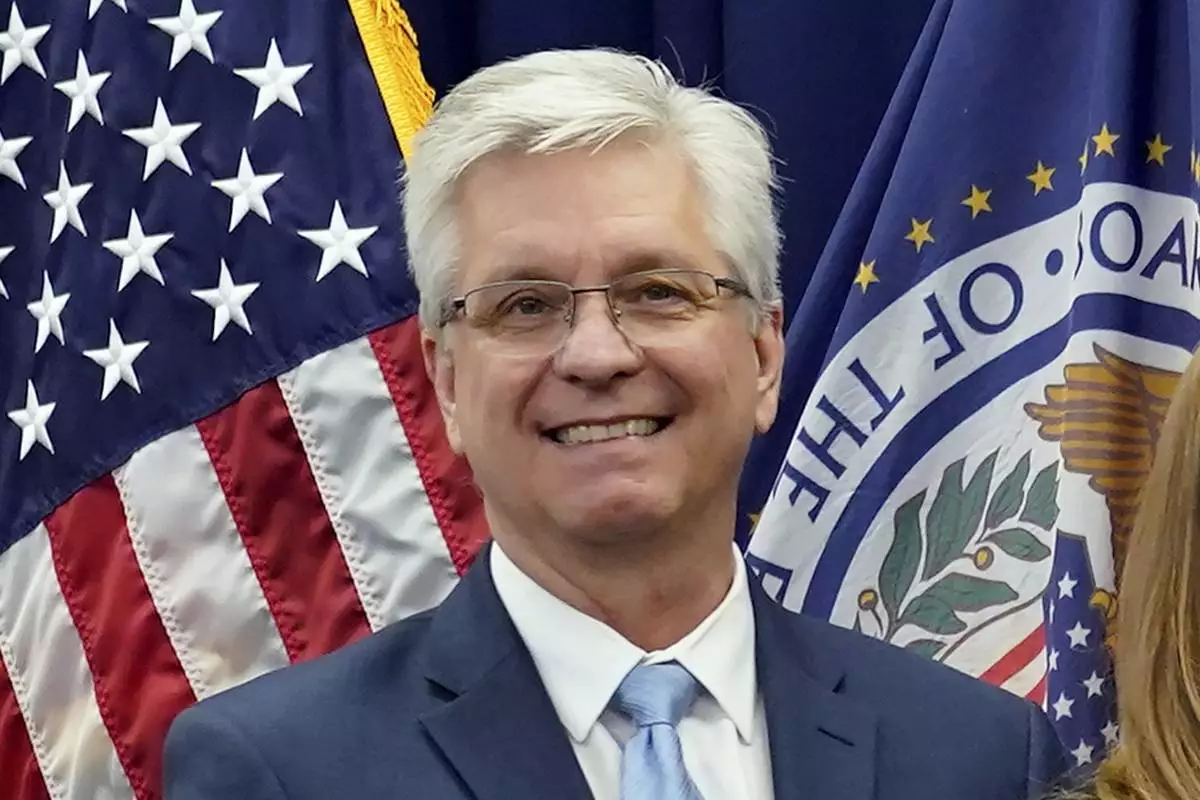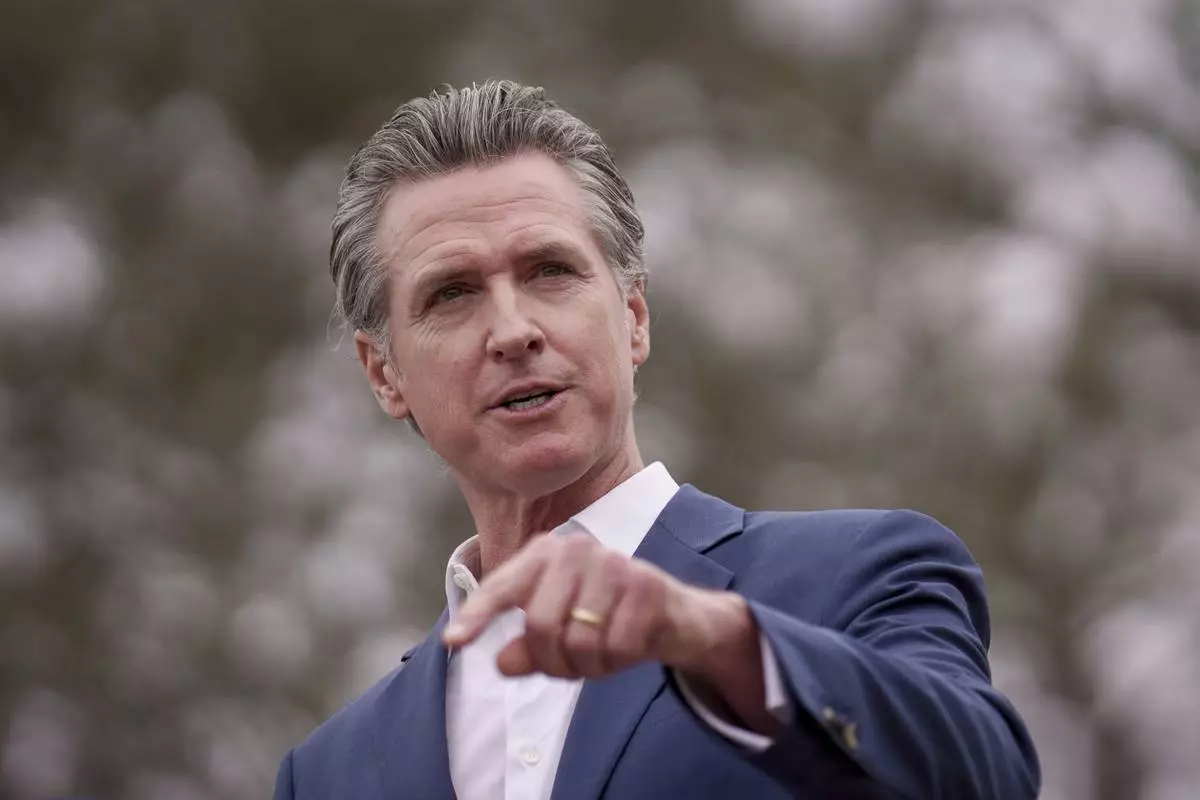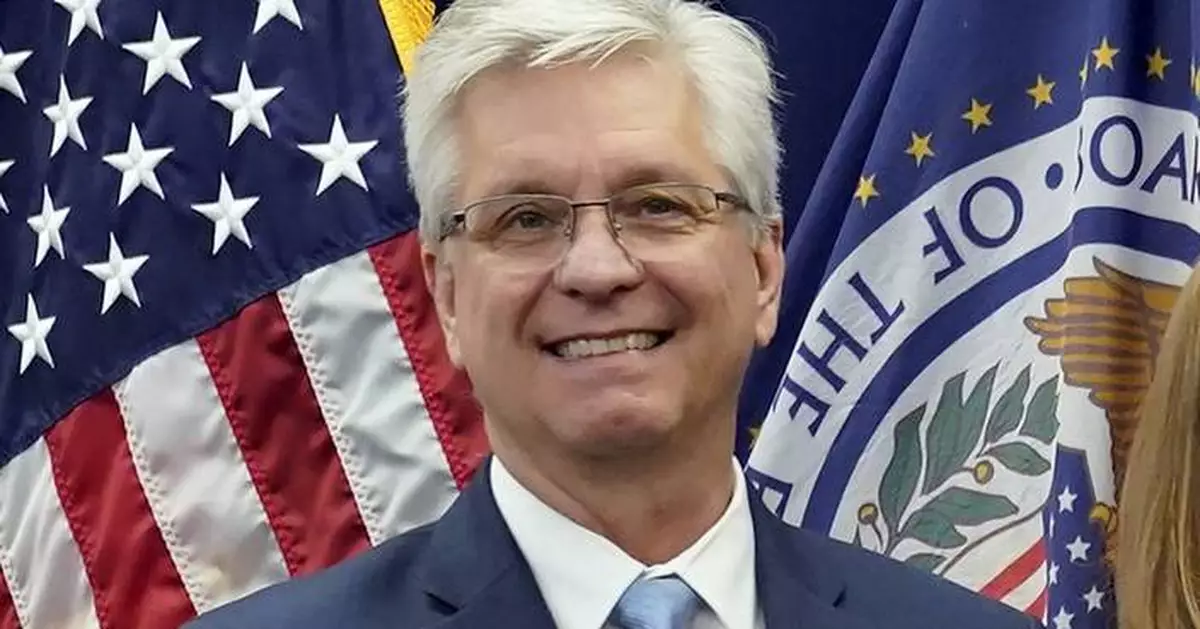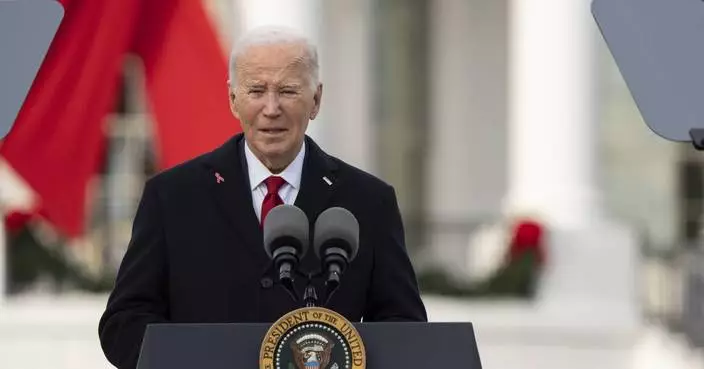WASHINGTON (AP) — A top Federal Reserve official said Monday that he is leaning toward supporting an interest rate cut when the Fed meets in two weeks but that evidence of persistent inflation before then could cause him to change that view.
Speaking at George Washington University, Christopher Waller, a key member of the Fed's Board of Governors, said he was confident that inflation is headed lower and that the central bank will likely keep reducing its key rate, which affects many consumer and business loans.
But he noted that there's a risk that inflation “may be getting stuck above” the Fed's 2% target, which would support an argument for keeping the Fed's rate unchanged this month.
“At present, I lean toward supporting a cut to the policy rate at our December meeting," Waller said in his remarks to a conference held by the American Institute for Economic Research. "But that decision will depend on whether data that we will receive before then surprises to the upside and alters my forecast for the path of inflation.”
Waller's caution reflects a notable shift in the economic and inflation outlook in the past month or so. Growth in consumer spending and the broader economy was robust in the July-September quarter. In addition, inflation picked up in October after having slowed for most of this year.
And Donald Trump's election victory has raised the prospect of widespread tariffs and mass deportations of migrants, both of which could elevate inflation. Some economists say they think the Fed might decide to cut its rate more slowly to allow time to evaluate the effects of Trump's policies.
With inflation having steadily fallen from its peak in 2022, the Fed reduced its key rate by a half-point in September and by a quarter-point in November. And it signaled in September that it expected to announce another quarter-point cut later this month. Yet inflation has remained above the Fed's target level, clouding the Fed's next step.
In October, “core” inflation, which excludes volatile food and energy costs, accelerated a bit. It rose 2.8% compared with a year earlier, up from 2.7% in September.
Waller stressed that if future economic reports showed inflation or growth deviating from the Fed's expected paths, he could favor keeping rates unchanged this month.
“If the data we receive between today and the next meeting surprise in a way that suggests our forecasts of slowing inflation and a moderating but still-solid economy are wrong, then I will be supportive of holding the policy rate constant,” he said.
Even so, Waller said the Fed’s benchmark rate is high enough to restrict economic growth and inflation and so a quarter-point rate cut wouldn't involve much risk of reigniting inflation.
“Cutting again will only mean that we aren’t pressing on the brake pedal quite as hard,” he said.
In his speech, Waller acknowledged some frustration over the recent persistence of inflation.
“I feel like an MMA fighter who keeps getting inflation in a choke hold, waiting for it to tap out, yet it keeps slipping out of my grasp at the last minute,” he said. "But let me assure you that submission is inevitable — inflation isn’t getting out of the octagon.”
In recent remarks, other Fed officials have also suggested that they haven’t yet made a final decision on whether to support a rate cut this month.
Earlier Monday, Raphael Bostic, president of the Fed’s Atlanta branch, said he was “keeping my options open” when asked whether he favored a rate cut in two weeks.

FILE - Federal Reserve Board of Governors member Christopher Waller poses on May 23, 2022, in Washington. (AP Photo/Patrick Semansky, File)
SACRAMENTO, Calif. (AP) — California Gov. Gavin Newsom and state lawmakers returned to the state Capitol on Monday to begin a special session to protect the state's progressive policies ahead of another Trump presidency.
The Democratic governor, a fierce critic of President-elect Donald Trump, is positioning California to once again be the center of a resistance effort against the conservative agenda. He is asking his Democratic allies in the Legislature, who hold supermajorities in both chambers, to approve additional funding to the attorney general's office to prepare for a robust legal fight against anticipated federal challenges.
Democratic Assemblymember Jesse Gabriel on Monday introduced legislation to set aside $25 million for legal fees to respond to potential attacks by the Trump administration on state policies regarding civil rights, climate change, immigration and abortion access.
“While we always hope to collaborate with our federal partners, California will be ready to vigorously defend our interests and values from any unlawful action by the incoming Trump Administration,” Gabriel said in a statement.
California sued the first Trump administration more than 120 times to various levels of success.
“We’re not going to be caught flat-footed,” Newsom said at a recent news conference.
Trump often depicts California as representing all he sees wrong in America. Democrats, which hold every statewide office in California and have commanding margins in the Legislature and congressional delegation, outnumber registered Republicans by nearly 2-to-1 statewide.
Trump called the Democratic governor “New-scum” during a campaign stop in Southern California and has relentlessly lambasted the Democratic stronghold over its large number of immigrants in the U.S. illegally, homeless population and thicket of regulations.
Trump also waded into a water rights battle over the endangered delta smelt, a tiny fish that has pitted environmentalists against farmers and threatened to withhold federal aid to a state increasingly under threat from wildfires. He also vowed to follow through with his campaign promise of carrying out the mass deportation of immigrants without legal status and prosecuting his political enemies.
Before the special session was set to begin, state lawmakers swore in more than two dozen new members and elect leaders for the 2025 legislative session.
Hundreds of people also demonstrated around the Capitol on Monday to urge the Legislature to try to stop Trump's mass deportation plans. They carried banners that said “Not one cent for mass deportation” and “MAGA out of California.”
“With the results of the presidential election, we need our state elected officials to use every tool and every resource they have available to them to protect our immigrant Californians,” protester Deborah Lee said.
State Attorney General Rob Bonta said his office will protect the state’s immigration population, while Newsom last week unveiled a proposal to revive a rebate program for electric vehicle purchases if the incoming Trump administration eliminates a federal tax credit for people who buy electric cars. Newsom is also considering creating a backup disaster relief fund for the wildfire-prone state after Trump’s threats.
Bonta announced legislation Monday aimed at bolstering reproductive rights in the state, including by allowing the attorney general to seek monetary penalties against local governments that infringe on those rights. The proposals are part of the state's efforts to safeguard against threats to abortion access after the U.S. Supreme Court overturned Roe v. Wade.
Republican lawmakers blasted Newsom and his Democratic allies over the special session. Rep. Vince Fong, who represents the state’s Central Valley farm belt, said California should work with the incoming Trump administration instead.
“Gavin Newsom’s actions are tone-deaf to the concerns of Californians who disapprove of the direction of our state and country,” Fong said in a video on social media.
Legislators also are expected to spend the year discussing ways to protect dozens of laws expected to be targeted by the Trump administration, including one that has made the state a sanctuary for people seeking abortions who live in states where such practices have been severely limited.
California, the nation’s most populous state, was the first to mandate that by 2035 all new cars, pickup trucks and SUVs sold in California be electric, hydrogen-powered or plug-in hybrids. The state also extends state-funded health care to all low-income residents regardless of their immigration status.
Newsom hasn't provided details about what actions the lawmakers will consider but said he wanted funding in place before Trump's inauguration day, Jan. 20. The state spent roughly $42 million in litigation costs during the first Trump administration, officials said.
California is projected to face a $2 billion budget deficit next year, with bigger shortfalls ahead. Gabriel, who sued the first Trump administration in 2017 when it tried to end a program to shield young immigrants from being deported, said lining up the funding now is “a wise investment."
California successfully clawed back $57 million between 2017 and 2018 after prevailing in a lawsuit to block the Trump administration from putting immigration enforcement conditions on certain federal law enforcement grants. Another legal victory over the citizenship question in the 2020 census forced the federal government to return $850,000 to the state, according to the attorney general's office.
“We are positioned, if necessary, to be the tip of the spear of the resistance and to push back against any unlawful or unconstitutional actions by the Trump administration,” said Gabriel, who chairs the budget committee.
During Trump’s first presidency, Democratic attorneys general banded together to file lawsuits over immigration, Trump’s travel ban for residents of Muslim countries, the environment, immigration and other topics. But Trump has one possible advantage this time around: He was aggressive in nominating conservative jurists to federal courts at all levels, including the Supreme Court.
Associated Press journalists Haven Daley and Sophie Austin contributed to this report.

FILE - California Gov. Gavin Newsom speaks during a press conference in Los Angeles, Wednesday, Sept. 25, 2024. (AP Photo/Eric Thayer, File)











